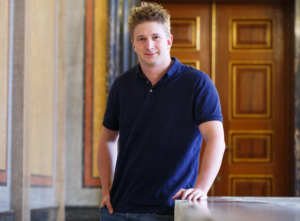Our PhD in Economics candidate Filip Staněk has recently won the first prize in the M6 competition that focuses on forecasts of stock price (returns) and risk.
Good Morning, Filip. It’s a pleasure to meet you. Could you introduce yourself briefly? Where are you from, where did you study, and what was your journey to CERGE-EI like?
Filip: Good morning! The pleasure is mine. I’m from the Czech Republic. I learned about CERGE-EI when I was finishing my bachelor’s degree at IES and then decided to participate in the Visiting Master’s Program. It was an extremely interesting year during which I learned a lot. So the decision about where to continue my PhD was an easy one.
Can you please tell us something about the competition in your own words? Is the aim of the competition to obtain empirical evidence on the causes and implications of financial forecasting?
Filip: M competitions are generally intended to assess the precision of different forecasting methods in a fair and transparent environment, mitigating issues such as data snooping and p-hacking. Each M competition focuses on a different aspect or area of forecasting.
The M6 competition analyzes the possibility of predicting stock market returns and achieving abnormal investment returns as a result. This is a highly contested issue as many practitioners claim to be capable of predicting returns and consistently attaining abnormal investment returns. On the other hand, the prevailing view among academics is that financial markets are efficient and it is therefore impossible to consistently predict the performance of individual assets and attain abnormal investment returns, at least not without access to insider information that has not yet been incorporated into the prices.
The M6 competition was designed to address this incongruity by asking participants to submit quintile predictions for 100 assets and form a portfolio using these 100 assets each month over the span of one year. The quality of these predictions and the return of the portfolio are then evaluated by the organizers at the end of each month.
This competition is quite a big deal in the forecasting community. Filip, you beat all professionals and teams! How do you feel?
Filip: I feel very fortunate about how it turned out, especially the quintile prediction part of the competition where I was testing a new type of meta-learning model that I’m developing as part of my dissertation. A preliminary draft of the underlying model has already been made public.
However, I would not necessarily use the term ‘beat’, as M competitions are generally not intended to be just horse races between participants. Instead, the goal is to analyze the performance of all models as a whole, to see which features successful models share and what the common pitfalls are. Performance of each individual model, despite being measured over the span of one year, is still partially obscured by statistical noise, making it difficult to tell whether one model truly outperforms another in expectation. In my case, I feel that I was luckier than most, especially in the investment part of the competition.
Despite favorable results, I would not say that my performance in either the quintile prediction task or the portfolio task is at odds with the efficient market hypothesis. In the former, the model essentially boiled down to predicting volatility, while in the latter, I tried to use the fact that the leaderboard was public, and one could take varying amounts of risk to maximize the probability of winning. However, this is not to say that for someone else it might be. Once the analysis of all the submissions comes out, it will make us wiser.
What do you remember about your studies at CERGE-EI?
Filip: If I had to point to a single thing, it would probably be my classmates. I fondly remember our hour-long discussions about various problems encountered during lectures or in our own research.
Would you recommend studying at CERGE-EI to your friends?
Filip: Definitely.
Was there anyone who inspired you to study here?
Filip: There were many people whose dedication and enthusiasm certainly inspired me to continue with my studies and sparked my interest in what I am doing now. Just to name two, Prof. Stanislav Anatolyev and Prof. Jan Zápal.
Filip Staněk is a PhD candidate at CERGE-EI, Prague; a joint workplace of Charles University and the Economics Institute of the Czech Academy of Sciences. His research interests are time-series econometrics, model evaluation, and selection. A note on the M6 Forecasting Competition by Filip is available here.
The M6 competition is a financial forecasting competition that focuses on forecasts of stock price (returns) and risk. It is similar to the previous five Makridakis competitions but this iteration focuses equally on investment decisions made based on the use of said forecasts. The competition aims to determine if above-average financial returns are achieved by one or a combination of factors such as the ability to accurately forecast overall market returns or those of individual stocks/ETFs, the ability to properly model market or individual stocks/ETF uncertainty, etc.

